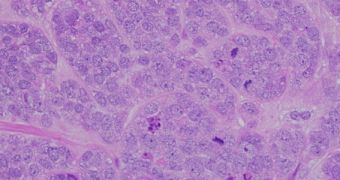Scientists with the Ohio State University were recently able to determine that a little-known protein is able to single-handedly stop the spread of breast cancer, if the gene that codes it is shut down. This molecule has only been recently tied to cancer, so researchers had no idea what to expect when they began assessing its role in this disease.
What the team has found is that breast cancer cells become significantly less likely to spread when the gene coding for the production of myoferlin are inactivated. This implies that lowered amounts of this molecule are responsible for slowing down the development of cancer. Scientists say that future efforts to develop new therapies could focus on this protein and its effects.
This investigation was carried out on lab mice, but the OSU team is hopeful that the results could potentially be applicable to humans as well. If that were the case, then in the future breast cancer would be limited to only the extent of the original tumor, and stop being a life-threatening condition.
Previously, the same team demonstrated that reducing the amount of myoferlin in cell cultures limited breast cancer cells' abilities to become separated from the original tumor site and spread through the body to produce metastasis. Patients in whom these cells start to flake off from tumors enter the terminal stages of the disease and usually die shortly thereafter.
In the new study, the team has shown that the same protective effect occurs in live animals as well. Details of their investigation are published in the latest issue of the open-access scientific journal PLoS ONE, which is edited by the Public Library of Science.
In all mice that received breast cancer cells, and that lacked the protein myoferlin, the disease developed in small, self-contained tumors that were unable to develop as fast and as aggressively as they usually do. In mice that were engineered to express higher amounts of myoferlin, the diseased cells penetrated the surrounding tissues and led to significant tumor growth.
“Theoretically, if a patient had a tumor in which the myoferlin level was low, it would be defined as small and a surgeon could remove it and it wouldn’t metastasize. That’s the nodule type of tumor we saw in the mice with the silenced protein,” says senior study author Douglas Kniss.
The expert holds an appointment as a professor of obstetrics and gynecology with the OSU Wexner Medical Center. He says that myoferlin appears to play a role in both molecular and mechanical processes associated with tumor development.

 14 DAY TRIAL //
14 DAY TRIAL //